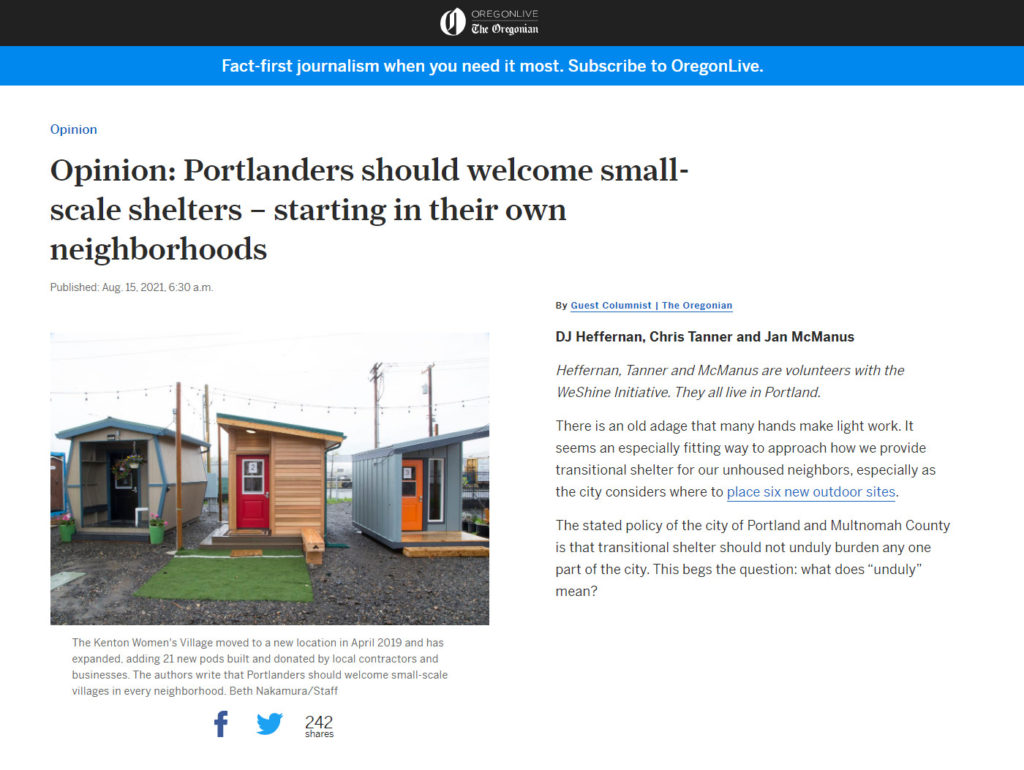 DJ Heffernan, Chris Tanner and Jan McManus are with the WeShine Initiative. They all live in Portland.
DJ Heffernan, Chris Tanner and Jan McManus are with the WeShine Initiative. They all live in Portland.
This editorial was published in The Oregonian August 15, 2021
There is an old adage that many hands make light work. It seems an especially fitting way to approach how we provide transitional shelter for our unhoused neighbors, especially as the city considers where to place six new outdoor sites.
The stated policy of the city of Portland and Multnomah County is that transitional shelter should not unduly burden any one part of the city. This begs the question: what does “unduly” mean?
The policy implies that Portland should consider a “fair-share” approach to sheltering houseless people. That is, if all neighborhoods do a little bit to shelter the unhoused, then the burden will be shared broadly and with reduced impacts. Portlanders should get behind this approach for many reasons.
First, the scale of the housing crisis and the houseless problem in Portland and other metropolitan areas is greater than the public sector alone can fix. In Portland, six or 10 or even 20 large encampments on public land cannot accommodate the estimated 4,000 people who are homeless, based on the 2019 Point in Time count. We need to develop many more temporary shelter sites than our public land resources can reasonably accommodate.
Second, even if a few public sites were large enough to provide temporary shelter for houseless Portlanders, this approach would not effectively help many people get back on their feet. The very size of large encampments results in continuous stimulation and frequent incidents that can trigger negative responses among the houseless, many of whom have trauma or mental health challenges. Additionally, crowded facilities and insufficient staff allow too many to fade into the fabric of the shelter community without the attention and support they need to transition to permanent housing. There is significant anecdotal and empirical research that demonstrates better outcomes from smaller emergency shelter models.
Third, it is a given that most of the people who are houseless today once lived in housing on private property. The private sector needs to be engaged to help mitigate this crisis. All Portlanders and all segments of the community should help shoulder responsibility for what has occurred and need to be part of the solution. Faith communities, non-profits, business owners, developers and others in the private sector have underused and/or vacant properties that could be used for temporary housing. Portland has, in the past, used public-private partnerships to deliver community solutions to an array of issues, from replacing decrepit athletic facilities at our public schools to building a light-rail extension that helps people all over the region get to the airport easily and affordably. Such a partnership would create opportunities for more shelter resources to be dispersed across all available land resources.
Fourth, small-scale villages offer the advantage that they can fit in almost anywhere. There is no neighborhood in Portland so built up or dense or remote that it could not support one or more micro-villages. A 5,000-square-foot area on a lot, whether in a neighborhood or commercial district, can house 10 to 15 people. Portland should establish a process for private sponsors to develop temporary shelter villages on private property to address the sanitation, safety, and social service needs that affect people living unhoused in every Portland neighborhood.
As volunteers with the WeShine Initiative, a nonprofit committed to building neighborhood-based micro villages, we urge the city and its regional partners to endorse a distributed model for temporary transitional shelter and to offer incentives to private sector participants willing to contribute resources to shelter our unhoused neighbors. That means siting shelters on private property –beginning in our neighborhoods of Sullivan’s Gulch and Laurelhurst – as well as in Multnomah Village, South Burlingame, Hillsdale and others. It also means being careful not to overburden the neighborhoods that are already contributing a share of our current shelters such as Kenton, Arleta, Downtown/Old Town, Sellwood/Moreland, and others. Public resources are limited. We need to be more creative and inclusive to resolve this crisis.
WeShine is ready to do its part and seeks partnerships with welcoming neighborhoods, faith communities, and willing property owners to take action and play a role in solving this crisis. For more information go to WeShinePDX.org.

